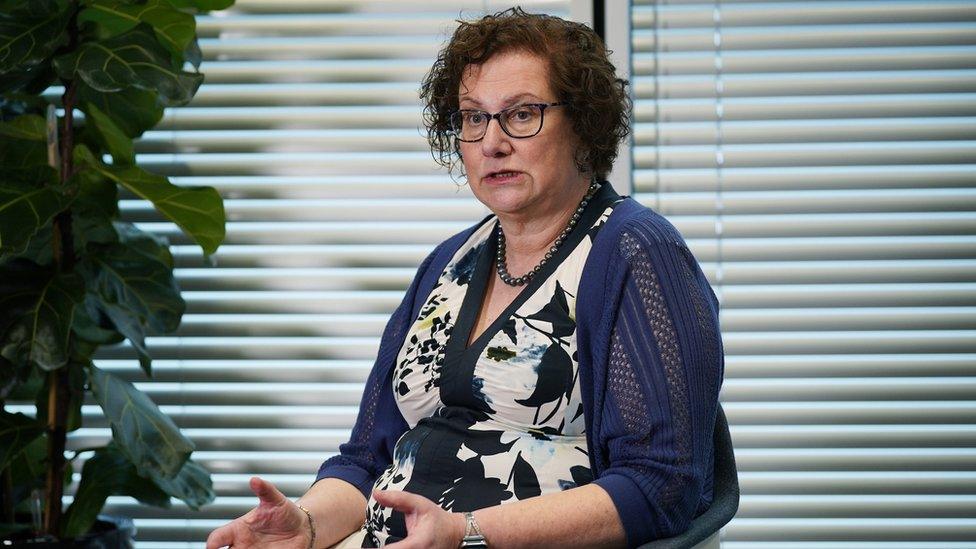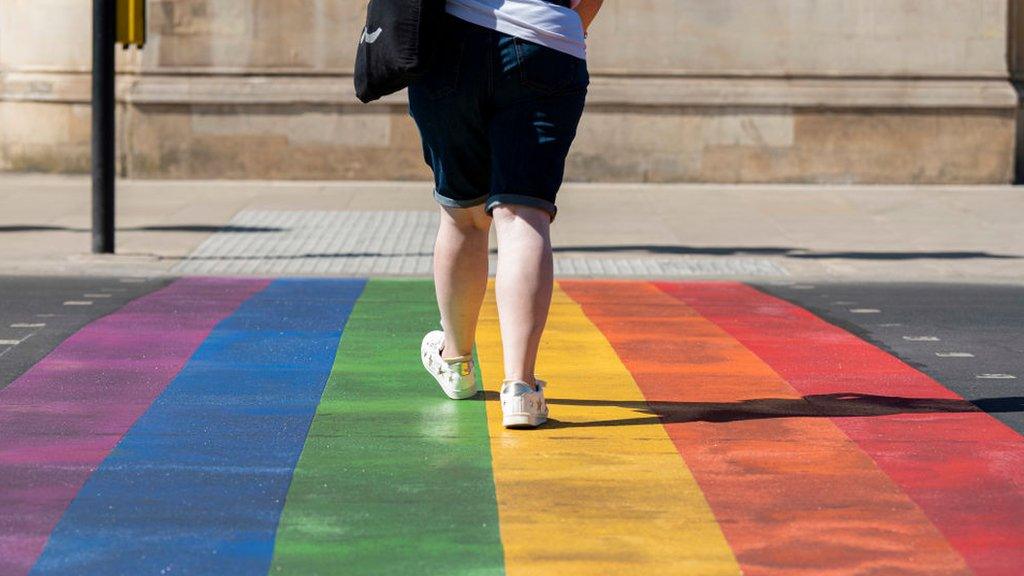Cass Review: Gender care report author attacks 'misinformation'
- Published

Retired consultant paediatrician Dr Cass is a former president of the Royal College of Paediatrics and published her review of gender services for under-18s in England on 10 April
The author of the landmark Cass review into gender identity services for young people says she is "very angry" about "misinformation" spread about her work.
Dr Hilary Cass's review this month found "remarkably weak" evidence on treatments such as puberty blockers.
The physician told the BBC some claims spread online about her evidence were "completely incorrect".
She said adults who "deliberately spread misinformation" put young people at risk, which was "unforgivable".
The Cass report, external, published on 10 April, looked at gender identity services for under-18s in NHS England.
It found gender medicine to be operating on "shaky foundations, external" when it came to the evidence for medical treatment like prescribing hormones to pause puberty or to transition to the opposite sex.
It said: "The reality is that we have no good evidence on the long-term outcomes of interventions to manage gender-related distress."
Watch: Dr Hilary Cass discussed gender care for children after her review was published
Speaking to the BBC's More or Less: Behind the Stats podcast, Dr Cass was asked about particular claims spread online about her review - one that "98% of the evidence" was ignored or dismissed by her, and one that she would only include gold-standard "double-blind randomised control" trials in the review.
She said the 98% claim was "completely incorrect".
A total of 103 scientific papers were analysed by her review, with 2% considered high quality, and 98% not.
"There were quite a number of studies that were considered to be moderate quality, and those were all included in the analysis," she said.
"So nearly 60% of the studies were actually included in what's called the synthesis."
And on the "double-blind" claim - where patients are randomly assigned to a treatment or placebo group, getting either medicine or nothing - she said "obviously" young people could not be blinded as to whether or not they were on puberty blockers or hormones because "it rapidly becomes obvious to them".
"But that of itself is not an issue because there are many other areas where that would apply," she said.
"If you were doing a trial, say, of acupuncture, people would know exactly what treatment that they were getting."

Is misinformation being spread about a review of trans youth medicine?
Investigating claims that the Cass Review into gender identity services for under-18s in England's NHS ignored the vast majority of evidence.
Listen now on BBC Sounds

She was asked how she had felt about those criticisms being levied at the report.
"I felt very angry, because I think that in many instances where people have been looking after these young people clinically, whether or not they've been doing the right thing, they have been trying to do their best," she said.
"Adults who deliberately spread misinformation about this topic are putting young people at risk, and in my view that is unforgivable.
"We're certainly not saying that no-one is going to benefit from these treatments, and I myself have spoken to young people who definitely do appear to have benefited.
"But what we need to understand is what's happening to the majority of people who've been through these treatments, and we just don't have that data.
"I certainly wouldn't want to embark on a treatment where somebody couldn't tell me with any accuracy what percentage chance there was of it being successful, and what the possibilities were of harms or side effects."
Separately, Dr Cass - who has talked about the "toxicity" of the debate around gender - told the Times, external she was getting some "pretty vile" emails in the wake of her report, and had been advised not to use public transport for security reasons.
The Cass review was commissioned by NHS England in 2020 after a sharp rise in the number of patients referred to the NHS who were questioning their gender.
It was announced after whistle-blowers raised concerns about care at the Gender Identity and Development Service (Gids) in London - which was the only specialist gender clinic for children and young people in England and Wales.
Gids closed last month, four years after it was rated as "inadequate" by inspectors. Regional hubs have now opened in London and Liverpool to replace it.
In the weeks leading up to the review's publication, NHS England said puberty blockers would no longer be routinely prescribed, and should only be given to gender-distressed children as part of clinical trials.
Earlier this week, two health boards in Scotland said they were pausing the prescription of puberty blockers for children.
NHS England has also announced a review of adult gender clinics but Dr Cass told the Times she would not be carrying out that review.
- Published18 April 2024

- Published11 April 2024

- Published10 April 2024

- Published16 May 2024

- Published12 March 2024
